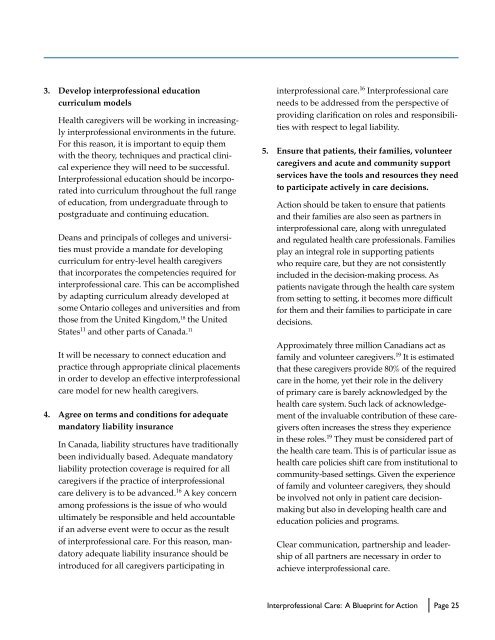Interprofessional Care: A Blueprint for Action - HealthForceOntario
Interprofessional Care: A Blueprint for Action - HealthForceOntario
Interprofessional Care: A Blueprint for Action - HealthForceOntario
Create successful ePaper yourself
Turn your PDF publications into a flip-book with our unique Google optimized e-Paper software.
3. Develop interprofessional education<br />
curriculum models<br />
Health caregivers will be working in increasingly<br />
interprofessional environments in the future.<br />
For this reason, it is important to equip them<br />
with the theory, techniques and practical clinical<br />
experience they will need to be successful.<br />
<strong>Interprofessional</strong> education should be incorporated<br />
into curriculum throughout the full range<br />
of education, from undergraduate through to<br />
postgraduate and continuing education.<br />
Deans and principals of colleges and universities<br />
must provide a mandate <strong>for</strong> developing<br />
curriculum <strong>for</strong> entry-level health caregivers<br />
that incorporates the competencies required <strong>for</strong><br />
interprofessional care. This can be accomplished<br />
by adapting curriculum already developed at<br />
some Ontario colleges and universities and from<br />
those from the United Kingdom, 18 the United<br />
States 11 and other parts of Canada. 11<br />
It will be necessary to connect education and<br />
practice through appropriate clinical placements<br />
in order to develop an effective interprofessional<br />
care model <strong>for</strong> new health caregivers.<br />
4. Agree on terms and conditions <strong>for</strong> adequate<br />
mandatory liability insurance<br />
In Canada, liability structures have traditionally<br />
been individually based. Adequate mandatory<br />
liability protection coverage is required <strong>for</strong> all<br />
caregivers if the practice of interprofessional<br />
care delivery is to be advanced. 16 A key concern<br />
among professions is the issue of who would<br />
ultimately be responsible and held accountable<br />
if an adverse event were to occur as the result<br />
of interprofessional care. For this reason, mandatory<br />
adequate liability insurance should be<br />
introduced <strong>for</strong> all caregivers participating in<br />
interprofessional care. 16 <strong>Interprofessional</strong> care<br />
needs to be addressed from the perspective of<br />
providing clarification on roles and responsibilities<br />
with respect to legal liability.<br />
5. Ensure that patients, their families, volunteer<br />
caregivers and acute and community support<br />
services have the tools and resources they need<br />
to participate actively in care decisions.<br />
<strong>Action</strong> should be taken to ensure that patients<br />
and their families are also seen as partners in<br />
interprofessional care, along with unregulated<br />
and regulated health care professionals. Families<br />
play an integral role in supporting patients<br />
who require care, but they are not consistently<br />
included in the decision-making process. As<br />
patients navigate through the health care system<br />
from setting to setting, it becomes more difficult<br />
<strong>for</strong> them and their families to participate in care<br />
decisions.<br />
Approximately three million Canadians act as<br />
family and volunteer caregivers. 19 It is estimated<br />
that these caregivers provide 80% of the required<br />
care in the home, yet their role in the delivery<br />
of primary care is barely acknowledged by the<br />
health care system. Such lack of acknowledgement<br />
of the invaluable contribution of these caregivers<br />
often increases the stress they experience<br />
in these roles. 19 They must be considered part of<br />
the health care team. This is of particular issue as<br />
health care policies shift care from institutional to<br />
community-based settings. Given the experience<br />
of family and volunteer caregivers, they should<br />
be involved not only in patient care decisionmaking<br />
but also in developing health care and<br />
education policies and programs.<br />
Clear communication, partnership and leadership<br />
of all partners are necessary in order to<br />
achieve interprofessional care.<br />
<strong>Interprofessional</strong> <strong>Care</strong>: A <strong>Blueprint</strong> <strong>for</strong> <strong>Action</strong> Page 25





